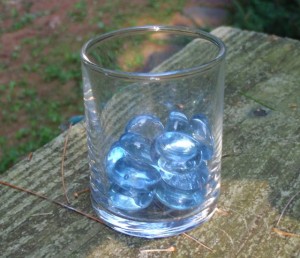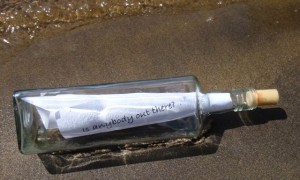 Before I discovered hulu, shutting off the cable was pretty effective in curbing my TV habit. One episode of hulu, though, is pretty much like just one drink for the alcoholic. I line up show after show in my queue and then I’m inert for the next several hours, watching until I’m a zombie. I watch until there are no more episodes of my current line up. By then it’s really late, and I feel dirty, like after cheap sex. The connection between my laptop and the TV makes a buzzing sound which I worry is zapping my precious computer. When I carry it downstairs, away from the tv, and onto its rightful place on my desk, it’s hot from all that streaming video, which is probably not good for it either. While it’s playing, though, I just sink into the mindless oblivion that is television watching, and don’t worry about the pile of papers on my desk including ones that say YOUR RESPONSE IS REQUIRED BY LAW. I also don’t worry about the fact that if it’s midnight now, going to bed early and waking up early is not going to happen so my whole next day is already screwed up.
Before I discovered hulu, shutting off the cable was pretty effective in curbing my TV habit. One episode of hulu, though, is pretty much like just one drink for the alcoholic. I line up show after show in my queue and then I’m inert for the next several hours, watching until I’m a zombie. I watch until there are no more episodes of my current line up. By then it’s really late, and I feel dirty, like after cheap sex. The connection between my laptop and the TV makes a buzzing sound which I worry is zapping my precious computer. When I carry it downstairs, away from the tv, and onto its rightful place on my desk, it’s hot from all that streaming video, which is probably not good for it either. While it’s playing, though, I just sink into the mindless oblivion that is television watching, and don’t worry about the pile of papers on my desk including ones that say YOUR RESPONSE IS REQUIRED BY LAW. I also don’t worry about the fact that if it’s midnight now, going to bed early and waking up early is not going to happen so my whole next day is already screwed up.
In my either/or thinking, I’m either a person who watches tv or a person who abstains. This summer I’ve been promising myself I’d stop the tv watching. Each week I told myself, okay, this week, no tv. But if we had no movie to watch with dinner, Wayne would say, “Want to watch a hulu?” and I always said yes. I knew I was supposed to say no, because a) eating in front of the tv causes mindless eating and consumption of more calories and therefore no good for either of our diets and b) I knew that once I sat in front of the tv for dinner, the rest of my evening and night were already gone.
On the other hand, one episode of hulu is a lot shorter than a full length movie. Theoretically, I could watch one show, and then read or meditate or get some work accomplished. Just one drink.
One solution is no movies, either. I don’t want to give them up, though. I also read that watching a funny tv show, because it makes you laugh, has been shown to lower stress levels. Scientifically supported rationalization for watching the Daily Show or some movie like “Be Cool.”
Part of me likes to be the weirdo who is so out of touch with the world because she doesn’t watch tv. The other part, the one that keeps winning, wants to be part of the world of Daily Show and Colbert Report watchers. Of course, if it was only those shows, it wouldn’t be such a problem. But after them I go to Burn Notice, Mental, Lie to Me, Bones, and sometimes even go to cbs.com for NCIS or CSI. Before I got rid of cable, I was addicted to Without a Trace, Criminal Minds, Law and Order CI, and those shows aren’t available in full episodes, so when we go away to a hotel, I binge on those. None of those shows can be rationalized by a daily dose of laughter. First of all, they’re not funny. Secondly they leave me with images of wackos who are waiting outside my house to attack me and do horrible things to me. I keep tuning in, though. they pull me in and I’m completely transported for a whole episode. When it’s over, I just want to be sucked into another one.
At one point it seemed like if the rule was just movies, that would be a solution. That didn’t work, though. Movies are long. Lots of nights I really oughtn’t plan on spending two hours in front of the tv screen. The other issue is the post movie let down. It’s even more intense than a post tv episode let down, and I feel even more desperate to keep downing more. I watch all the special features, even when they’re painfully dull. Then, I’ll watch whatever is on one of the five horrible tv channels we still have coming into the house, like the Style network. At that time of night, usually I end up watching “Clean House” which plays out the exact same drama in each episode of a dysfunctional family who can’t throw out anything, living in a huge mess, who cry over giving up their things for the yard sale, and then they are wowed by the newly decorated clean house.
Yesterday I wondered if tv addiction is so much like alcoholism that there really is no “middle way.” What if there was a way to consume television like a normal person?
So, here’s my idea: TV tokens. I put 8 glass pebbles into a small glass. (They used to be in a flower vase.) Each piece represents half an hour, and that’s my allotment for the week: four hours. Last night I moved three tokens from the weekly allotment glass into the used up glass. Sure enough, after the movie, wanting to save my half hours for something good, I didn’t watch Clean House. I turned off the tv and got ready for bed. Maybe this’ll work.

 The Y pool is cloudy, crowded and too warm for laps. But there are no other pools in town unless you are a student at the college—which I am no longer. Their pool was clear, fairly empty, and just the right temperature. On the plus side, the Y pool has windows to the outside, which is better for my mental health. It’s probably also safer. The lifeguards take their jobs seriously, rotating positions on some sort of schedule. The lifeguards at the college pool read and made lanyards, occasionally glancing at the pool.
The Y pool is cloudy, crowded and too warm for laps. But there are no other pools in town unless you are a student at the college—which I am no longer. Their pool was clear, fairly empty, and just the right temperature. On the plus side, the Y pool has windows to the outside, which is better for my mental health. It’s probably also safer. The lifeguards take their jobs seriously, rotating positions on some sort of schedule. The lifeguards at the college pool read and made lanyards, occasionally glancing at the pool.


 I’m in the midst of a writing program and am revisiting a piece about my own struggle with ADHD and this popped into my head–there are all kinds of reasons kids don’t turn in their work on time, or at all, in some cases. They are all usually labeled “lazy” by teachers. As I look at my own story, I remembered being called lazy in second grade when I was really trying. So I know how painful that label can be.
I’m in the midst of a writing program and am revisiting a piece about my own struggle with ADHD and this popped into my head–there are all kinds of reasons kids don’t turn in their work on time, or at all, in some cases. They are all usually labeled “lazy” by teachers. As I look at my own story, I remembered being called lazy in second grade when I was really trying. So I know how painful that label can be.